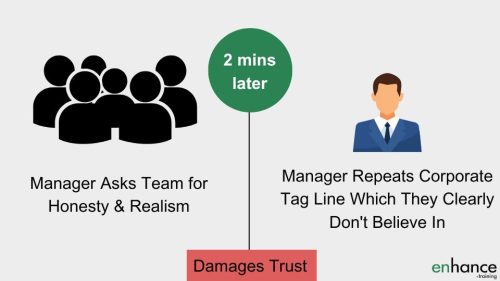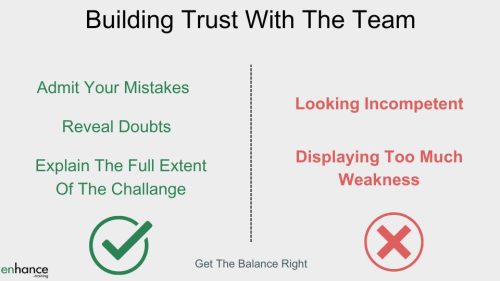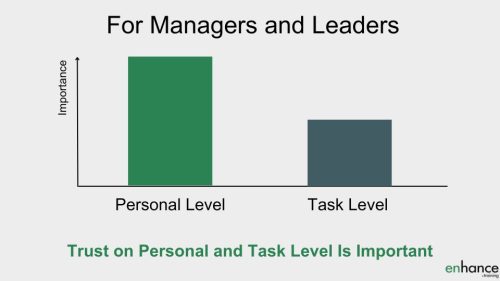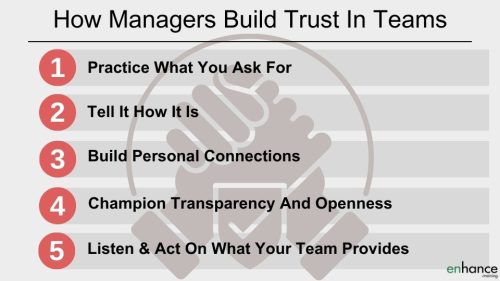How Managers Build Trust In Teams – 5 Practical Ways to Build Trust

How managers build trust in teams matters. Being able to build trust quickly is more than a skill. Building trust starts with your approach to the team, what you believe in and how you display this to your team as much as what you do and say.
If you don’t have the trust of your team, you don’t have a team. You will struggle to lead people who don’t trust you. You will struggle to maintain or improve team performance and you will struggle to do your job as a manager.
Trust must be earned and building trust does take work and personal commitment. I am not sharing tips, tricks or techniques. I am sharing trust building principles that will work with all teams and consistently over years. You can tell your team exactly what you are doing and get the same result – trust being built.
As we go through, I will be giving you practical tips to implement so you can improve your trust building today and onwards.
How Managers Build Trust In Teams – 5 practical ways to build trust
- Practice What You Ask For
- Tell It How It Is
- Build Personal Connections
- Champion Transparency and Openness
- Listen & Act On What Your Team Provides
Watch on YouTube
Listen on Podcast
Practice What You Ask For – The first principle for how managers build trust in teams
I have seen managers ask for the team to be honest and realistic and then when answering a question 2 minutes later provides the corporate tag line, what they have been told to say, that they clearly don’t believe in.
If winning team trust is what you want, you must practice what you ask for. If you want your team to tell you the truth, then tell them the truth.
For example – If you have been told to tell the team a specific message which you don’t believe in, then say to your team that you have been told to say a certain message which is XXX and that is all you are allowed to say. This conveys the message needed – balanced with being honest with the team and keeping your bosses happy.
Every action, decision, and behaviour you undertake communicates what you believe in – to your team and those around you.
Ensure that the actions and decisions you take and the behaviour you display matches what you believe in. This is managing with authenticity which in my view is absolutely critical to building trust.

What you believe in and demonstrate consistently is what your team will trust.
Another example – To be trusted as a manager, you must trust your team. Micromanagement, checking up on people every hour, not taking what they say as the truth … are all actions that don’t extent trust from you to your team. If you are not practising trust, how will you be trusted in return?
When building team trust think carefully about your decisions and actions before you take them. Ask “Am I making this decision (or taking this action) for the good of the team?” If you consistently make decisions and take actions that help the team, that move team members or the whole team towards team targets then you will build trust.
If you make decisions or take actions to help yourself, to advance your career or to protect yourself rather than help the team … your team will know or find out and trust will be damaged or destroyed. If you have no trust, you have no team.
Practice what you ask for. Do your best to live the rules you set for your team. Lead by example and do what you are asking.

Tell It How It Is – The second principle for how managers build trust
I really like to know where I stand and getting honest feedback helps hugely. If I am doing a rubbish job, I want to know so I can change what I am doing. If I am doing really well, then I want to know why I am doing well so I can do more of it in the right context.
If you are not prepared to share what you think and believe in, then how will your team trust you. Of course you have to share what you think diplomatically. You need to be empathetic; you need to be considerate. Be all those and still be true to yourself.
When a team member is not doing well, tell them how they can improve in private and make the time to help them improve. Be specific and be helpful and tell it how it is.
When creating trust at work, you should also share when you mess up. Admit your mistakes honestly. Admit you have doubts about what you have been asked to do by others. Explain the true extent of the challenge being faced by the team or by you. There is a balance between sharing errors and mistakes and looking incompetent or displaying too much weakness. Keep on the right side of this line and you will build a lot of trust with your team by showing some of your weaknesses.
Tell it how it is. When the situation is positive shout it from the rooftops. When the situation is negative, be careful how you communicate the message while still telling it how it is.
Being open and honest, while being true to yourself, creates a lot of trust.

Build Personal Connections – The third principle for how managers build trust
Trusting someone to do a task is quite different from trusting the other person to look after us as a person.
For example, I thought my worst boss was great at many of the tasks he needed to do in his job and I trusted in how well he would do them. I didn’t trust him to help me, to look out for me in the slightest. Same two people, two very different levels of trust.
In my view, to be a good manager or leader building trust on a personal level is way more important than building trust in your professional skills or technical competence. Yes the latter counts and are important. Consistently demonstrating that you care about your team members, that you keep their interests in mind in making decisions, that you will go out of your way to help them or have their back, even if it costs you personally, is key in how managers build trust in teams.
So get your mindset and approach to your team really clear in your own mind and make sure it is focused on helping team members and the team overall.
Then work to help and support team members; show you are willing to protect them from the politics, unreasonable demands etc; show you want to help them move their careers forward at a pace that suits them. Work to consistently demonstrate that you are working for the interests of the team, and when aligned, the interests of the individuals in your team.
Build personal connections with your team and show them that they can trust you to look after their interests.

Champion Transparency and Openness – The fourth principle for how leaders build trust in teams
Work with your team to narrow down what tasks, activities and projects make a difference to the team’s results and how the team is going to reach and beat targets.
Then you can align the team’s roles and responsibilities clearly with how the team is going to meet and beat team targets. Work to educate the team in what matters to the team’s performance and how each person can contribute to that performance.
When every team member understands the what and the why, then work on creating open and transparent measurement of progress towards team targets. There are several reasons for creating measurement:
- Numbers are clear cut unlike opinions – everyone will know how they are doing
- You tap into peer pressure – no-one likes letting team members down or not pulling their weight
- You and the rest of the team can spot problems quickly and step in help equally quickly.
Creating transparency and openness in a team is a big step towards building trust. Everyone is looking at the same information and making judgements and decisions based on the same information.
The team can see that the data is telling them the same thing you are. The more consistent the picture, the more trust you build and the quicker you build it.
Listen & Act On What Your Team Provides – the fifth principle for how managers build trust in teams
As a manager, listening to your team and acting on what they tell you is priceless. They are closer to the action than you are likely to be. They will be the first to spot problems and probably be able to create good solutions or at least input into creating good solutions.
Listening to what they tell you and acting on the issues or suggestions provided is a great way of building team trust. You are taking team members seriously. You are showing you value their ideas, opinions, and solutions by acting on them.
Picture this scenario – a team member has a problem, comes over and tells you about it. You ask questions to understand more about the problem and check on the data to make sure you are being told the complete picture. Then you work to get the problem solved permanently. Think about what messages you are sending. The messages will include:
- Your problems are important to me, and I will work to solve them for you or with you
- I trust you to bring me issues that you struggle to solve and that they are impacting you
- Your issues and ideas matter, so I will listen to you and consider what you tell me
- I want you and the team to do well.
- I want you to bring me more issues so we can solve them.
- I respect you as a person
You get the idea. There is a lot of trust being built in this simple scenario. You are looking out for them. You are helping them. You are doing what most people would think is the right thing.
Listening and acting on what the team tell you is a great display of trust on your part of the team members and they will trust you more for taking sensible fair action.
Listening is a more important management skill than giving great speeches by far in my opinion. Listen to your team.

in summary
There is a lot that goes into how leaders build trust in teams. Gaining trust at work is more about what you believe in, the actions and decisions you take and the behaviours you display than about what you say.
Be true to your beliefs while also balancing what you need to do in your job as a manager. Being authentic to yourself is a key part of building team trust. Pay a lot of attention to your actions, decisions, and behaviours. Each is communicating what you believe and think to your team.
The 5 principles we have been through to get your team to trust you are:
- Practice What You Ask For
- Tell It How It Is
- Build Personal Connections
- Champion Transparency and Openness
- Listen & Act On What Your Team Provides
Trust is massively important in creating high performing teams and teams where it is a pleasure to come to work. Do you best to implement the principles covered in this article. You, your team and company will be better off for your efforts.

How many teams really trust their managers? How many managers should be trusted by their teams?
If you manage your behaviour and focus your decisions and actions of doing what is best to support and help your team achieve its goals you will take a massive step towards gaining team trust quickly.
Be honest and open, protect each person in the team sensibly and work with the team with the right intensions and you will be trusted.






